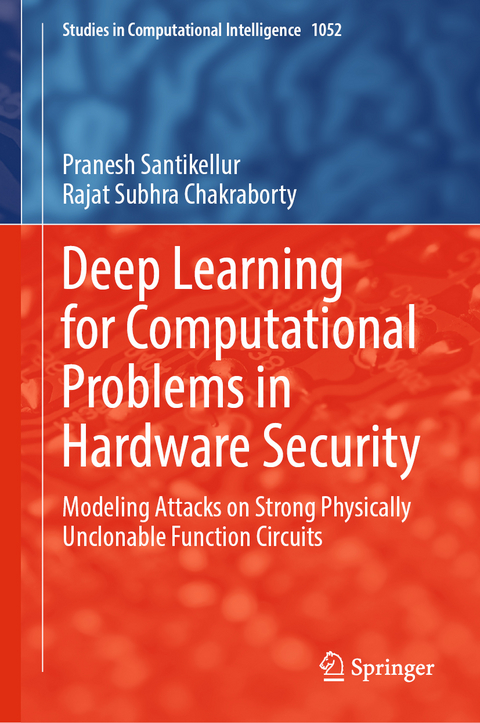
Deep Learning for Computational Problems in Hardware Security
Springer Verlag, Singapore
978-981-19-4016-3 (ISBN)
Pranesh Santikellur is a Ph.D. student and a Senior Research Fellow in the Department of Computer Science and Engineering at the Indian Institute of Technology, Kharagpur. He received his B.E. degree in Electronics & Communication Engineering from Visvesvaraya Technological University, Belgaum, India, in 2010. He has a total of 6 years of industry experience at Horner Engineering India Pvt. Ltd. and Processor Systems. His primary research interest lies in hardware security, deep learning, and programmable logic controller security. He is an IEEE student member. Rajat Subhra Chakraborty is an Associate Professor in the Department of Computer Science & Engineering of the Indian Institute of Technology, Kharagpur, India. He has professional experience working in National Semiconductor and Advanced Micro Devices (AMD). His research interest lies in the areas of hardware security, VLSI design, digital watermarking, and digital image forensics, in which he has published 4 books and over 100 papers in international journals and conferences of repute. He holds 2 granted U.S. patents. His publications have received over 3600 citations to date. Dr. Chakraborty has a Ph.D. in Computer Engineering from Case Western Reserve University, USA, and is a senior member of IEEE and ACM.
Chapter 1: Introduction.- Chapter 2: Fundamental Concepts of Machine Learning.- Chapter 3: Supervised Machine Learning Algorithms for PUF Modeling Attacks.- Chapter 4: Deep Learning based PUF Modeling Attacks.- Chapter 5: Tensor Regression based PUF Modeling Attack.- Chapter 6: Binarized Neural Network based PUF Modeling.- Chapter 7: Conclusions and Future Work.
| Erscheinungsdatum | 20.09.2022 |
|---|---|
| Reihe/Serie | Studies in Computational Intelligence ; 1052 |
| Zusatzinfo | 18 Illustrations, color; 13 Illustrations, black and white; XIII, 84 p. 31 illus., 18 illus. in color. |
| Verlagsort | Singapore |
| Sprache | englisch |
| Maße | 155 x 235 mm |
| Themenwelt | Informatik ► Theorie / Studium ► Künstliche Intelligenz / Robotik |
| Mathematik / Informatik ► Mathematik | |
| Technik ► Elektrotechnik / Energietechnik | |
| ISBN-10 | 981-19-4016-9 / 9811940169 |
| ISBN-13 | 978-981-19-4016-3 / 9789811940163 |
| Zustand | Neuware |
| Informationen gemäß Produktsicherheitsverordnung (GPSR) | |
| Haben Sie eine Frage zum Produkt? |
aus dem Bereich


